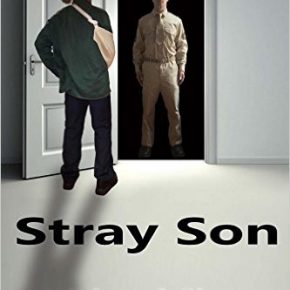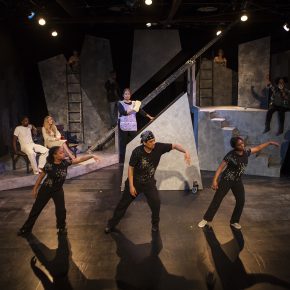Christopher Bernard’s Amor i Kaos: Fifth installment
I see the following:
The interior of a west coast café, with seismic support beams making a graceful right-angled triangle in the middle of the room.
Numerous café chairs, a dozen tables of various shapes and sizes, most of them occupied by leisurely eating and chatting lunchers (most are in couples, with a few small groups, and several loners seriously addressing their plates; there is a common table with several loners exaggeratedly ignoring each other behind their open lap tops); two iron railings lead up to the café’s glass door through a wall of glass looking out onto the street.
Passing cars, a truck, bus, males and females bustling, pacing, stalking by at businesslike gaits (mostly adults, a few adolescents, no children), two small, abandoned-looking trees across the street, the entrance to a parking garage with a sign flashing in red (“CAR COMING”), a cat sleeping on a backpack near the curb (no sign of the owner), three, no four, pigeons pecking in the gutter a few feet from the sleeping cat, the entrance to a 7-11, the aggressively hip windows of a Banana Republic, two narrow green doors in a wall, shut except for one that seems invitingly ajar, several open laptops, three smartphones being swiped or tapped by anxious-looking teenagers, three ballpoint pens held by two students and a tourist (the pen in my hand is the fourth), a V-neck sweater and two turtlenecks, two white quilt parkas, a business suit holding a briefcase in swift passage across the view, shadowy reflections across the street, sun, clouds, sky (just barely visible if I stretch forward and look up).
I smell: coffee, cloves, cinnamon, pastry custard, bread.
I feel: the press of corduroy against my legs. The squeeze of a vest against my torso. The rub against my wrist of my new watchband.


